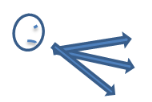Thinking about choice…do you take responsibility for the choices you make?
 To become aware of the choices we make and being upfront about them – this is one way of getting to know ourselves better. Our choices are a clear reflection of us for all to see – we had better have a handle on them ourselves. But there are other ways of looking at choice – try these mind-bogglers.
To become aware of the choices we make and being upfront about them – this is one way of getting to know ourselves better. Our choices are a clear reflection of us for all to see – we had better have a handle on them ourselves. But there are other ways of looking at choice – try these mind-bogglers.
Pre-determined?
There are many aspects to choice. Determinism would suggest that choice is an illusion and you really haven’t got any choice. Its position is that a long chain of cause and effect accounts entirely for the decisions we make, and the feeling of choice that goes with them. Can’t stand the thought of that? Determinism would say, “Well, of course not!” Your reaction was fully predictable because already determined by the pre-existing causes in your life (and of the stream of pre-existing causes preceding your entry into the world),
Chaos?
Chaos theory is the determinist’s way of having it both ways – every choice, every circumstance, is fully determined by the chain of cause and effect, but because so vast and intermingled, they can’t be predicted – because predictability requires that we know all the factors involved. Given the age and complexity of the universe and its development, that is a practical impossibility.
Free will
Do you prefer to feel that you have free will? Most of us do… and we judge others harshly on the choices we assume they make freely. Because we base our notions of justice on free will, we have a penal system intended to force us to exercise our free will in the interests of social harmony. But as a result of that, we have a hugely unfair penal system, where disproportionate numbers of the most disadvantaged of our society find themselves imprisoned and at the mercy of their custodians. If we truly have free will, then how would you account for this disproportion? Persons who are indigenous, or come from low socio-economic areas, or are mentally ill, or who have had a traumatic childhood, do they have a “bad” free will while those who have had an easier upbringing have a noble free will?
Altruism
A research study showed that believing you have free will (that is, that you have choice) brings about altruistic behaviour, while believing you haven’t got free will brings about more aggressive, selfish behaviour. Wow, that’s a corker. I think I know whom I’d rather have for company… but maybe that is non-altruistic of me… so do I believe in free will?
Is addiction a choice?
“People make a choice for their addictive behaviours.” It is hard not to believe that, isn’t it? For instance, the addiction that some have to poker machines, all the while fooling themselves that the waste of their time – and much more money than they can afford … is a freely chosen enjoyment. And yet, when we look at the painful, miserable lives of addicts, no matter what the addiction is to, it is too hard to suppose that anyone would really choose it.
How far would you go?
So it seems that the matter of choice is much more problematic than we might have supposed. If you take the cause and effect route, you might end up having to excuse all choices, pleasant or unpleasant, because of prior causes over which the individual has no control and hence no choice in their decision-making. Urrgh.. so Hitler really had no choice? All of the monstrous acts of horror throughout human history are inevitable and we can hold no-one to blame?
Cognitive therapy for Stress; Zen; Yoga
Cognitive therapies go exactly that way – huge amounts of stress are relieved when we give up on supposing that we know how others should behave, or even loading ourselves with should rules. And giving up blaming others enables a peaceful relationship with self and others. Zen and some other philosophical approaches suggest that the world happens of its own accord and serene observation is the way to go – not taking anything personally. In Yoga, examples abound of the instruction to give up the sense of being the doer, that is, allow that even one’s actions are a part of an irresistible force of nature impinging on the personal self, and that the universe itself unfolds as it will. How far can you go along that line?
Choosing choice and free will
If you go for choice and free will, you have to account for how you yourself judge and punish those less fortunate than yourself, whose choices may come of having dealt with harsher circumstances than your own – freely made, but differently reasoned. So are you punishing people for their reasoning or for their behaviour? Since when has reasoning been a matter for judgment? Or perhaps we could focus more on reasoning than we do on actions….?
Not an easy matter after all
However, we might take it as a given at least that we can become aware of our choices and their outcomes – and so take responsibility for them with clear knowledge of the assumptions we normally make them on. For us, surely the question is,
How can we become fully aware of our choices and fully aware of what forms them, and what will change when we do? Remember that judgment, criticism and perfectionism is a choice you may have made, too.
